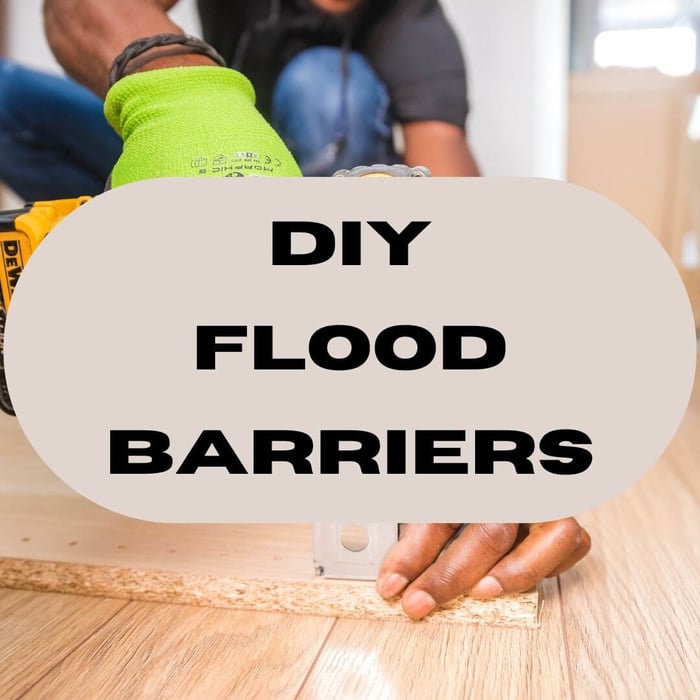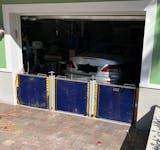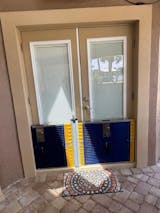Floods are natural disasters that can wreak havoc on homes and communities, causing significant damage to property and posing serious threats to human safety. As the frequency of extreme weather events increases, individuals living in flood-prone areas are becoming more proactive in seeking flood control measures to protect their homes and belongings. While the internet is filled with do-it-yourself (DIY) flood barrier solutions, it's essential to examine their effectiveness, cost-efficiency, and practicality. In this article, we'll explore various popular DIY flood control hacks and compare them to the benefits of modern removable flood barriers to determine the most efficient and reliable solution for home protection.
DIY Flood Barrier Solutions:
Sandbags
One of the most common DIY flood barriers is sandbags. Although they are readily available and relatively inexpensive, they have significant drawbacks. Sandbags can be challenging and time-consuming to fill and place correctly. Moreover, they may not provide a watertight seal, allowing water to seep through or erode the barrier. Sandbags also become heavy and difficult to move once they absorb water, making the removal process arduous and messy.
Plastic Sheeting and Plywood
Another DIY approach involves using plastic sheeting or plywood to cover doors and windows as a makeshift flood barrier. While these materials may help prevent some water from entering, they are not a reliable long-term solution. They lack proper sealing, and water can find its way through gaps and cracks, leading to significant water damage.

DIY Water-filled Barriers
Some choose to create water-filled barriers using large plastic containers or barrels. While this idea seems promising, it has several limitations. These containers can be expensive to purchase or construct, and transporting and filling them with water can be impractical, especially during an emergency. Furthermore, their effectiveness depends on a secure seal, which can be difficult to achieve with makeshift materials.
Permeable Flood Barriers
DIY permeable barriers, such as using burlap sacks or gravel-filled tubes, have been suggested as an eco-friendly option. However, these barriers are designed to allow water to pass through to some extent, making them less effective in preventing floodwater from entering homes entirely. In severe flood scenarios, permeable barriers may not offer sufficient protection.
Removable Flood Barriers for Home
While the above DIY flood barrier solutions might seem viable in theory, they often fall short when put to the test in real-life flood situations. They require substantial time, effort, and resources, and their effectiveness is uncertain. In contrast, investing in modern removable flood barriers offers a host of advantages that make them a superior choice for home flood protection:

- Ease of Installation and Removal:
Modern removable flood barriers are designed for quick and easy installation. They come with clear instructions and require minimal tools, making them accessible to homeowners of all skill levels. In the event of an impending flood, you can install these barriers swiftly, ensuring timely protection for your property. Additionally, when the flood risk has passed, removing these barriers is equally straightforward, leaving no mess behind.
- Superior Protection:
Unlike DIY solutions that may leave gaps or prove permeable to water, professionally designed removable flood barriers offer superior protection. They are engineered to create a watertight seal around doors, windows, and other vulnerable entry points, effectively keeping floodwater out of your home.
- Reusability and Durability:
Modern flood barriers are built to last. They are constructed from high-quality materials that can withstand harsh weather conditions and repeated use. While some DIY solutions, like sandbags, may need replacement after each use, removable flood barriers can be stored and reused for multiple flood seasons, providing long-term value for your investment.
- Aesthetically Pleasing:
Removable flood barriers are often designed to be discreet and aesthetically pleasing, complementing the appearance of your home. They can be customized to fit your specific needs and can even enhance the visual appeal of your property.
- Reliable Performance:
Professionally manufactured flood barriers undergo rigorous testing to ensure their performance and durability. They are engineered to meet specific flood protection standards and are more likely to provide consistent and reliable defense against floodwaters.
- Peace of Mind:
By opting for modern removable flood barriers, homeowners can enjoy peace of mind during flood seasons. Knowing that your home is equipped with a reliable flood protection system reduces stress and allows you to focus on your safety and that of your loved ones.
Conclusion
While DIY flood barrier solutions may seem attractive due to their affordability and ease of accessibility, they often lack the effectiveness and reliability needed to safeguard homes from devastating floods. Sandbags, plastic sheeting, and other makeshift barriers are prone to failure, leaving homeowners vulnerable to significant damage.
On the other hand, investing in modern removable flood barriers provides a far more efficient and effective solution. With their ease of installation, durability, and superior protection, these barriers offer unmatched value for homeowners in flood-prone areas. Ultimately, purchasing professionally designed flood barriers is a wise choice that ensures the safety of your home, your loved ones, and your peace of mind during challenging times.
Contact Dam Easy today to learn about modern flood barriers for home and other modern convenient flood control solutions that will guarantee your safety in the face of the upcoming flood season!
El dique de contención de inundaciones.

$949.00
Dam easy® para evitar la inundación de la represa. Las inundaciones son cada vez más frecuentes en todo el mundo.Lo que solía ser un fenómeno centenario se ha convertido en una tendencia estacional que los propietarios deben afrontar. … Read More


















